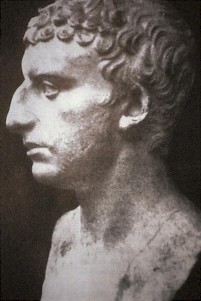Josephus' Jewish Antiquities
Josephus' Jewish Antiquities: large retelling of the history of the Jews, in which the author tries to explain Judaism to foreigners.

The twenty volumes of the Jewish Antiquities, in which Flavius Josephus explains Jewish history to a non-Jewish audience, appeared in 94. Its model is a book by the Greek historian Dionysius of Halicarnassus, who wrote twenty books of Roman Antiquities. This time, Josephus wrote the text in Greek and did not use a translator. The result is a text which is less pleasant to read, even though its subject matter is very interesting. One of the author's aims is to show that the Jewish culture is older than any other then existing culture; the same idea can be found in the writings of Philo of Alexandria, a Jewish philosopher who lived in the first half of the first century CE.
The first half of the Jewish Antiquities is essentially nothing but a rephrasing of biblical texts: it tells the story of the Jews from the creation until the Persian rule. However, Josephus realized that non-Jews might reasonably ask questions about the reliability. Therefore, he supports the Biblical account with quotes from, for example, Berossus, who had read Babylonian sources, and Menander of Ephesus, who claimed to have studied Tyrian sources. There is some debate about the quotations, which may be from an intermediary source, Alexander Polyhistor, who took some liberties.
The second half of the Jewish Antiquities, dealing with the centuries between Alexander the Great and the great war against the Romans, is based on previous historians (Polybius, 1 Maccabees, Nicolaus of Damascus, and the author of the Letter of Aristeas may be identified). Where the original sources are now lost, we may assume that Josephus has simply told in his own words what he has found in these sources. His value as a historian is as great as his sources.
Since the Jewish War and the Jewish Antiquities both cover the period 175 BCE - 66 CE, we can compare the two works. It has been shown that the second version is never a simple revision of what Josephus had written before; usually, he goes back to the same earlier historians and rephrases what he has read. For example, the account in the Jewish War 1.358-2.117 of king Herod's rule is not simply revised in the books fifteen, sixteen and seventeen of the Jewish Antiquities; instead, Josephus has again retold what was written in one basic source, Nicolaus of Damascus. Furthermore, there are additions that must come from the oral tradition of the Pharisees.
The Jewish Antiquities are a kind of world history, and Flavius Josephus' view is biblical. In the past, God used the Egyptians, Assyrians, Babylonians, Persians and Greeks to punish or to rescue His chosen people; now it was the Roman's turn to punish them. This was something the Greeks and Romans of his age could understand all too well. In almost every case, you can read 'Fortune' or 'Destiny' or 'Fate' instead of 'God'; on the other hand, when Flavius Josephus uses one of these common pagan expressions, he must have had the Jewish God in mind.
One of the most remarkable passages in the Jewish Antiquities is the "Testimonium Flavianum":
At this time there appeared Jesus, a wise man, if indeed one should call him a man. For he was a doer of startling deeds, a teacher of the people who receive the truth with pleasure. And he gained a following both among many Jews and among many of Greek origin. He was the Messiah. And when Pilate, because of an accusation made by the leading men among us, condemned him to the cross, those who had loved him previously did not cease to do so. For he appeared to them on the third day, living again, just as the divine prophets had spoken of these and countless other wondrous things about him. And up until this very day the tribe of Christians, named after him, has not died out.note
It is unlikely that a pious Jew like Flavius Josephus would have written that Jesus 'appeared to them on the third day, living again'; consequently, there has been a lot of scholarly debate about the explanation of this strange remark. Some argued that we had to admit that Flavius Josephus had become a Christian; others maintained that it was made up by some Byzantine monk who copied the Jewish Antiquities. The latter explanation can be ruled out because a more or less identical text had been found in an Arabic translation of a part of the Jewish Antiquities. In 1991, John Meier has suggested that Josephus did in fact mention Jesus, but that the text was glossed by a Christian author.note His reconstruction of the text is as follows:
At this time there appeared Jesus, a wise man. For he was a doer of startling deeds, a teacher of the people who receive the truth with pleasure. And he gained a following both among many Jews and among many of Greek origin. And when Pilate, because of an accusation made by the leading men among us, condemned him to the cross, those who had loved him previously did not cease to do so. And up until this very day the tribe of Christians, named after him, has not died out.
Even in this reconstruction, this text is of monumental importance. Not only is Flavius Josephus the only first century non-Christian writer mentioning Jesus' life, teachings and death independently of the of the gospels, but he also suggests that Jesus was innocent. A straightforward report would have told that Pilate executed the man from Nazareth because he was considered to be the king of the Jews. But instead of naming the accusation, the Jewish historian names the accusers. Since he usually delights in writing about the deserved punishment of rebels and pretenders, the fact that he does not inform us of the charge, means that he thought that Jesus was innocent.